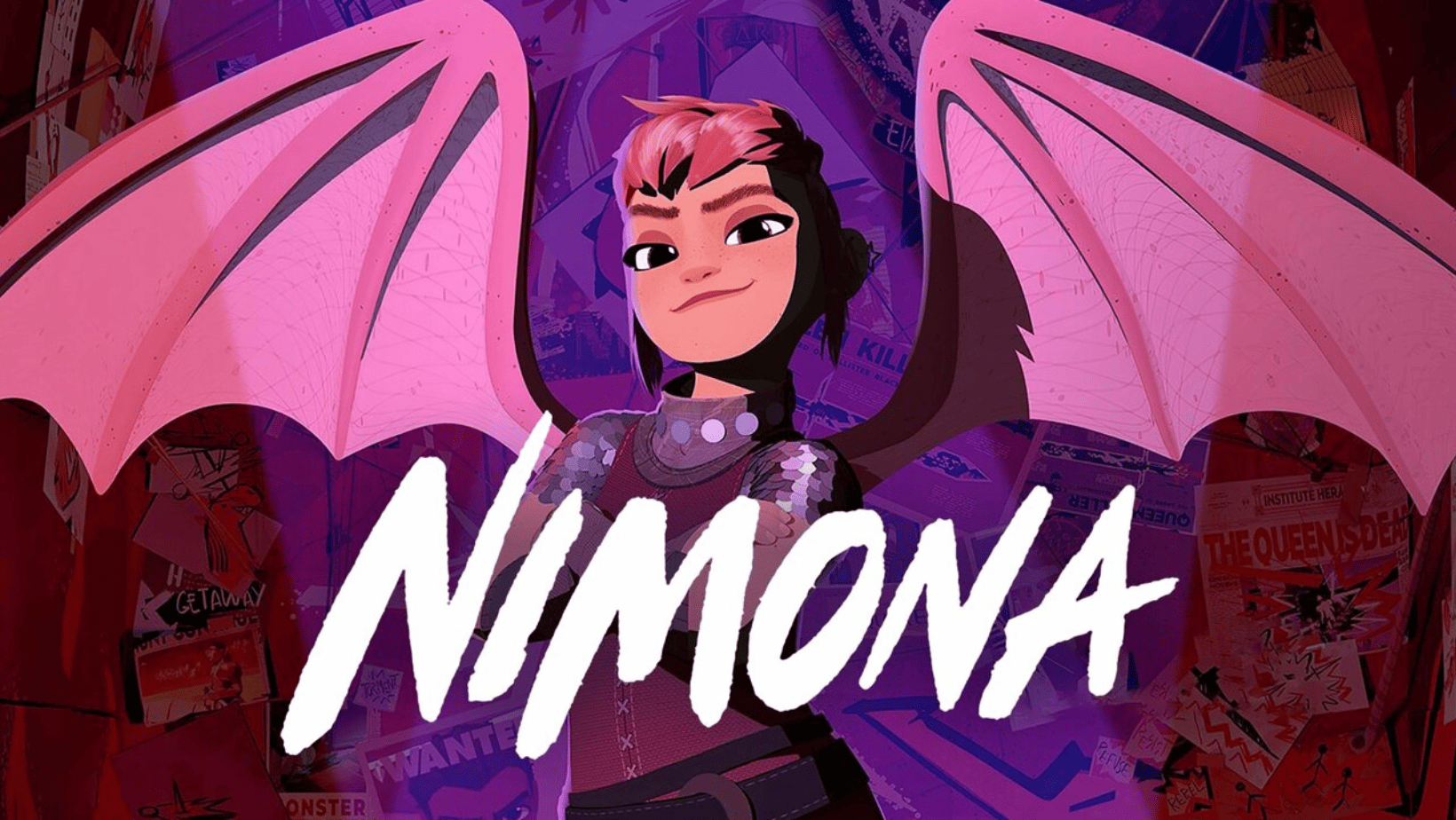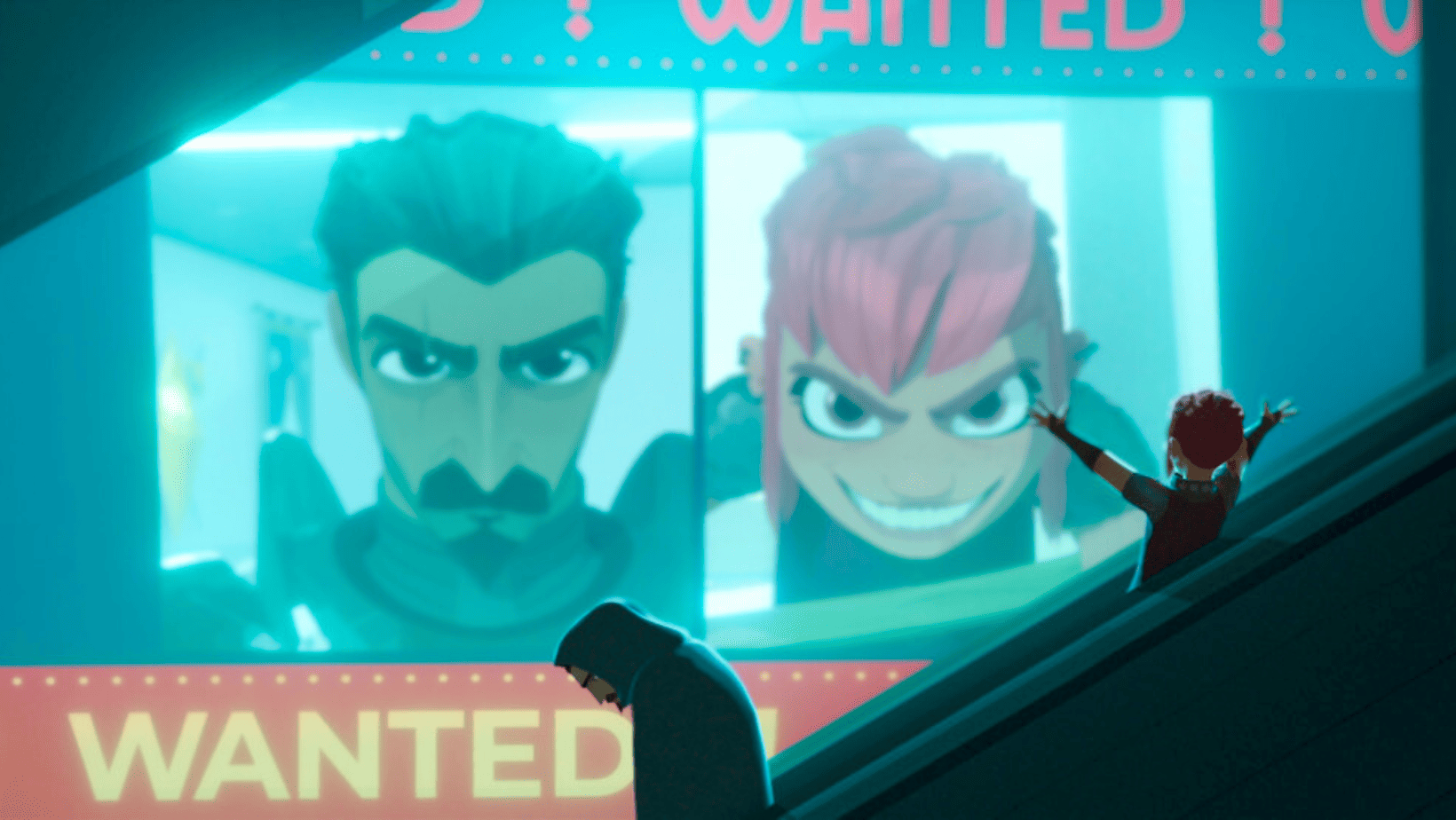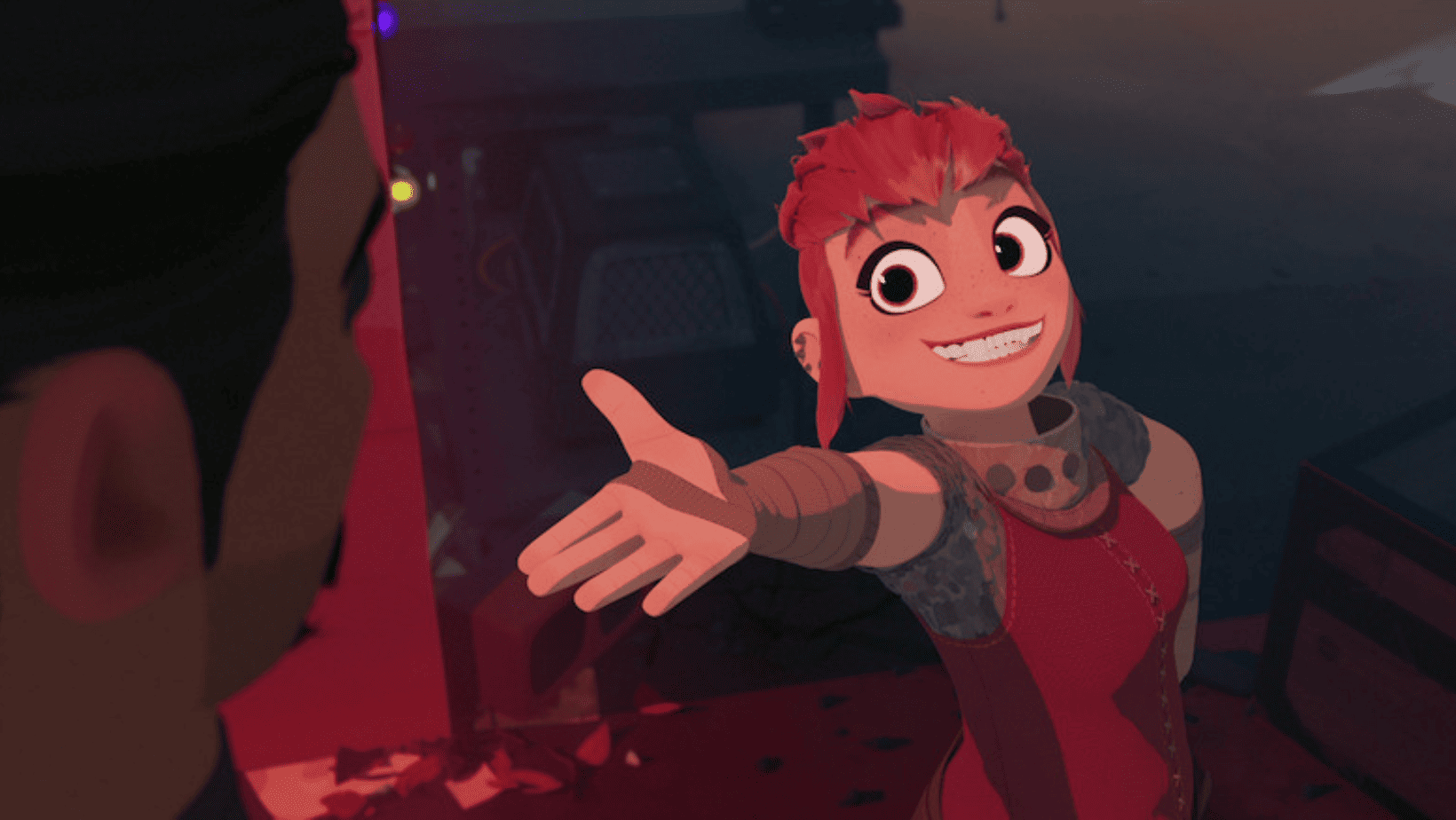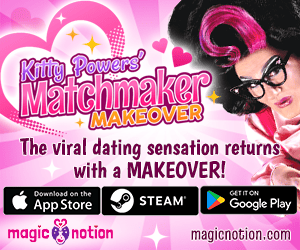
Nimona is the trans and queer story we need right now
Blue Sky Studio’s Nimona from ND Stevenson has had me, and the rest of my trans siblings, in a chokehold from the moment it released on Netflix on June 30. And for a very good reason.
Set in a futuristic medieval world, Nimona follows protagonist Ballister Boldheart (Riz Ahmed), an extremely down-on-his-luck knight who is framed for killing the Queen. This leads him to join forces with Nimona (Chloe Moretz Grace), a shapeshifter who aids him in his quest to clear his name. Nimona’s gender is gloriously unestablished. Ballister has a boyfriend. It’s already a pretty queer story. But that’s not what had me bawling into my hands immediately after watching it.
There’s a moment where Ballister asks (exasperation clear in his voice) Nimona to be just herself. “Can you just be you, please?” He later makes a point that it would be easier if Nimona, currently taking the form of a pink, pizza-munching gorilla, would just stick to her ‘natural form’ of a young girl.
“Easier for who?” Nimona shoots back.
Hearing this, something inside me shifted, as though my belly flipped over like a pancake on a hot pan. It flipped again during the scene where Ballister questions Nimona on what would happen if she didn’t shapeshift. Does shapeshifting hurt? How does it affect her? She answers with a jokey tone that she would “die” but not really die. It just certainly wouldn’t be living anymore.

Being from the UK, I’ve seen firsthand how hatred for the LGBTQ+ community has been slowly rising over the years, particularly hatred towards the trans community. Back in 2013, the UK was seen as the top country for trans rights. Fast forward a few years and now the UK government is going out of its way to block any legislation that would make trans folks’ lives easier. It isn’t just the UK either, with the US also fighting back against anti-trans groups, legislation, and more. All in all, the vibes are so far from being good right now, it’s enough to make you want to cry.
With all that’s going on in the world at the back of my mind, sitting down to watch Nimona for the first time did make me cry. Anyone who watches it would need to be blind, deaf, and buried 100 feet underground not to see the obvious queer metaphor that runs rampant through the film — and that goes double for the Nimona graphic novel too.
In Nimona, being different is reason enough for people to view you as a monster. It’s a metaphor that’s been played up many times before in animation — Shrek, while cursed, remains a relevant example — but it’s an effective one. It highlights how differences lead to oppression from a hegemonic society, and how the oppressed often have no choice but to conform to these expectations and die a little inside each and every day (after all, you’d be alive, but you “sure wouldn’t be living.” Alternatively, you say ‘eff that’ and live your life as you want it to be, but always under the ire of those who would rather you not exist in the first place. Nimona falls on the latter end of the spectrum, unapologetically herself, and in my mind, a genderfluid icon through and through. She sees Ballister’s desire for her to present as ‘normal’ and calls it out for what it is: close-mindedness. Her refusal to conform is not only necessary for the story, but it perfectly captures why Nimona not only spoke to me, but why it’s the queer and trans story we need right now: there is no such thing as being the perfect victim.
Before Nimona’s chaos brings a new lease of life to his life, Ballister is the unfortunate fella who is presented as the perfect victim. Despite being a ‘commoner,’ Ballister is thrust into the limelight due to his desire to become a knight and serve the Queen – a role usually given only to the nobility. In news montages that feel hauntingly similar to BBC news stories about how marginalized people are making others ‘feel silenced’ or ‘unsafe,’ citizens of the city speak out about how they don’t feel like Ballister can possibly look after them due to him being a commoner. Even among his fellow knights, Ballister is relentlessly bullied. The only one who doesn’t is Ambrosius Goldenloin — who just so happens to be Ballister’s boyfriend. Even so, nobody comes to Ballister’s aid, and he is expected to sit back and take it like a champ. Because to retaliate? That would only prove that everyone’s thoughts about him were right. Only, it doesn’t matter in the end: once Ballister is framed, the rest of the city feels vindication that they were right: Ballister is a monster, after all.

Yet even after he is framed, Ballister still continues to hope that he only needs to prove himself innocent to have people believe him. It’s only after Ambrosius, the one person he felt would believe him no matter what, turns on him that Ballister snaps and embraces Nimona’s methods of violence to fight back against the knights and the order’s Director. While this betrayal is certainly fresh and plays a part in Ballister realizing the institution he longs to conform to is actually corrupt, it’s the city’s reaction to Nimona which ultimately sways him. Once Nimona shifts into a young girl to help show the girl they’ve just saved that she means no harm, only to be met with the young girl calling them a monster and pointing a sword at her, and how that affects Nimona later on… Only then does Ballister come to the realization that it doesn’t matter how they present or appear to the city, its inhabitants have already made up their minds about them.
Of course, that doesn’t stop Ballister — and later, Nimona — from still doing good. They choose to save the city in the end, not because they feel that they owe the city or to prove they “aren’t as bad as others like them,” but because it’s the right thing to do. As for Nimona, she comes back to herself because Ballister, the light in the darkness, the shield from the overwhelming amount of hatred they’ve dealt with for thousands of years, sees Nimona for who they truly are and shows that they love them unconditionally. It’s what saves Nimona from being crushed by despair, and gives her the courage to fight on. And, in so many ways, it’s what I needed to see. The world at large may seem hateful, but there are always going to be people there who see you, your complexities, and the humanity that lies between each and every one of them.
After all, people are so much more than what you see on the surface.
Nimona is available to watch now over on Netflix.





